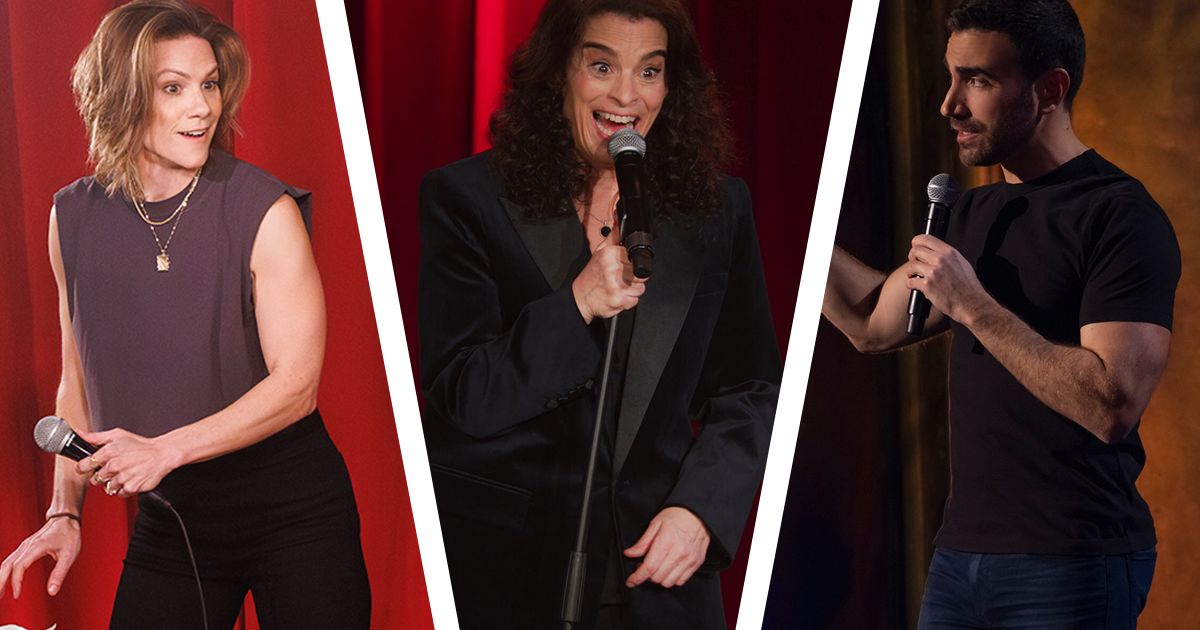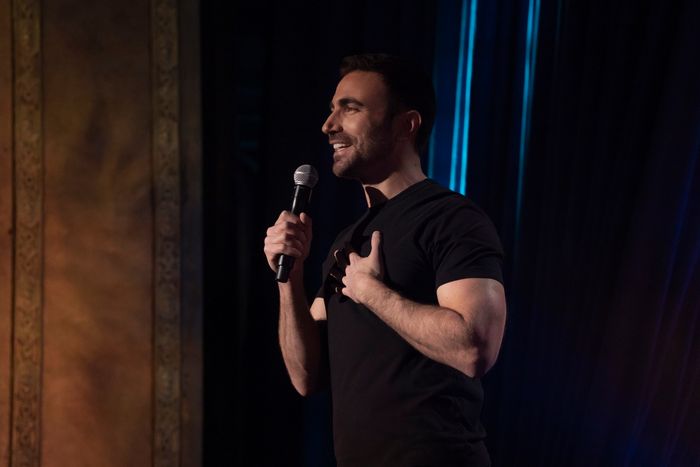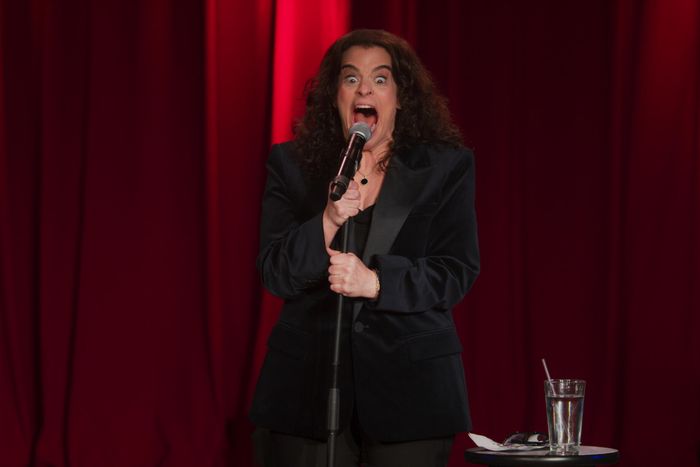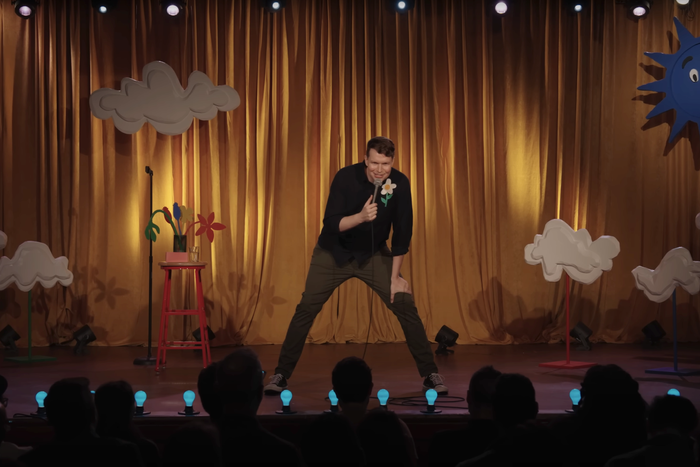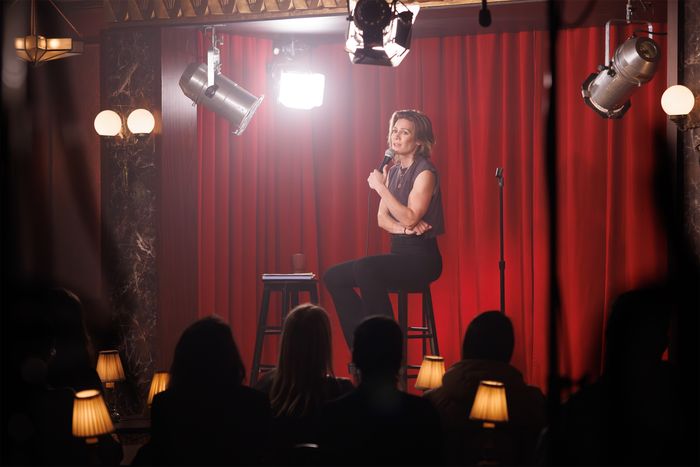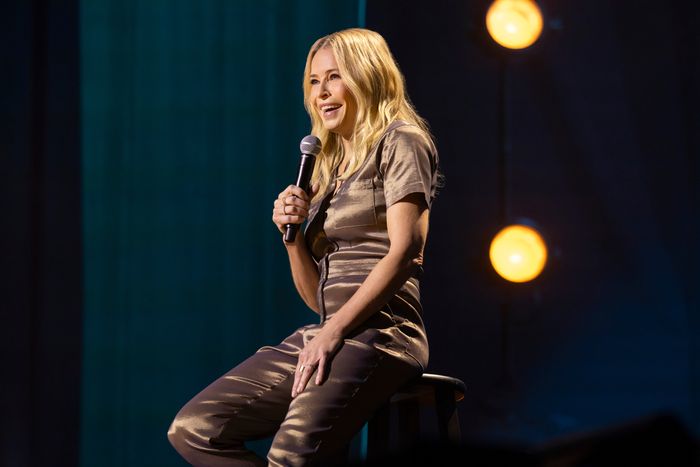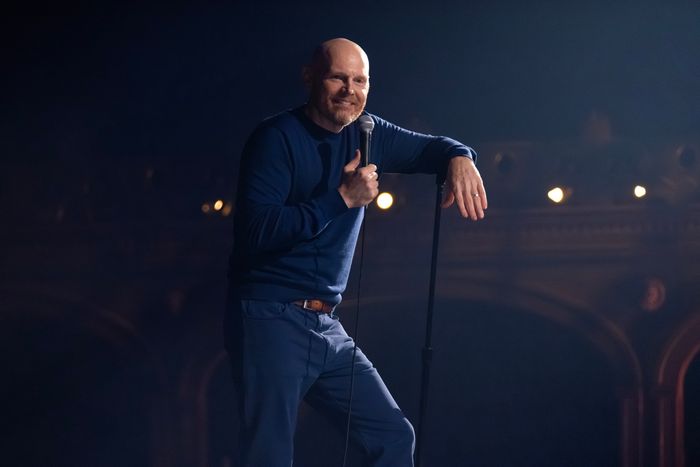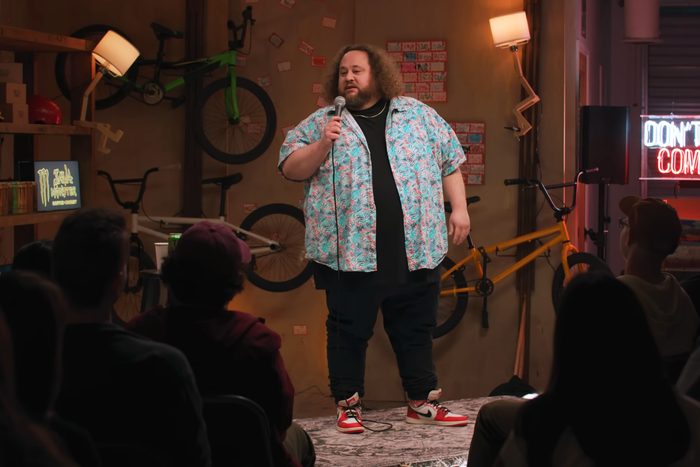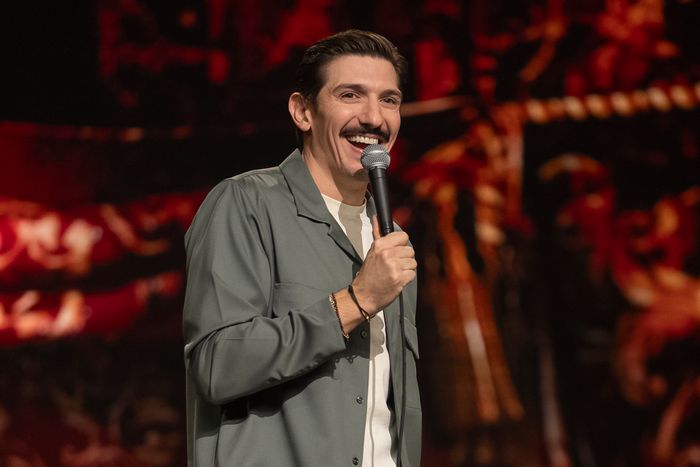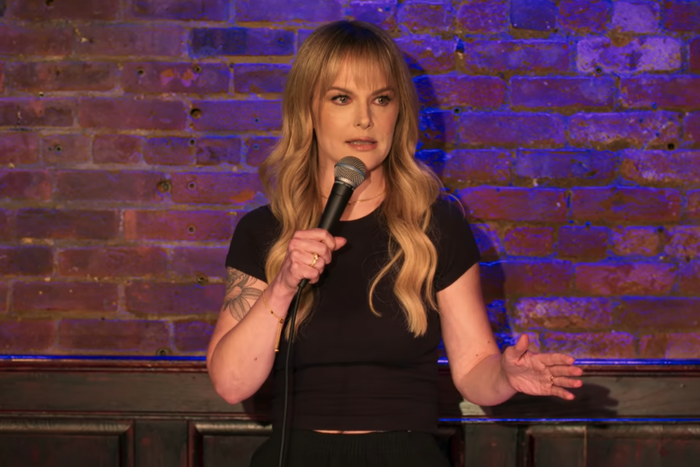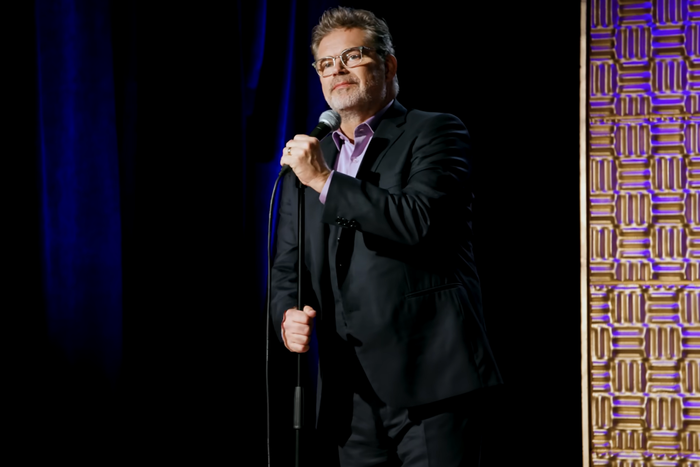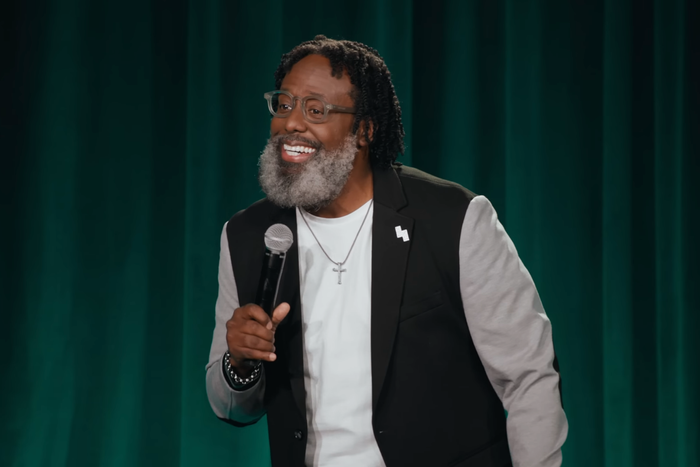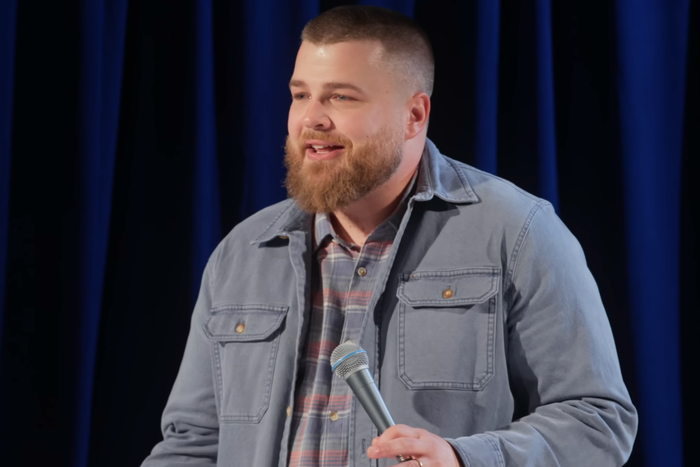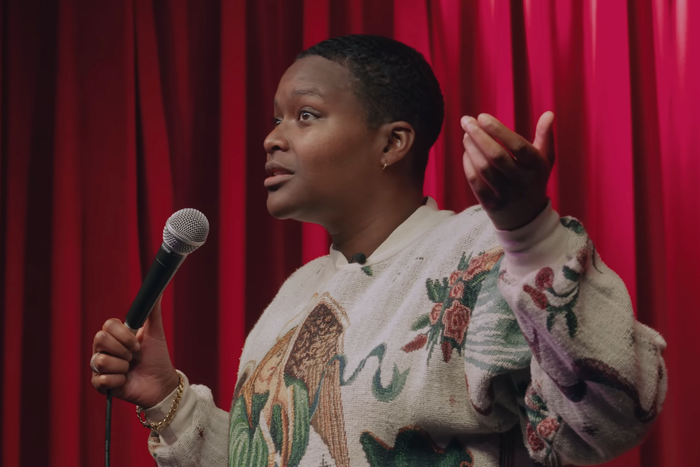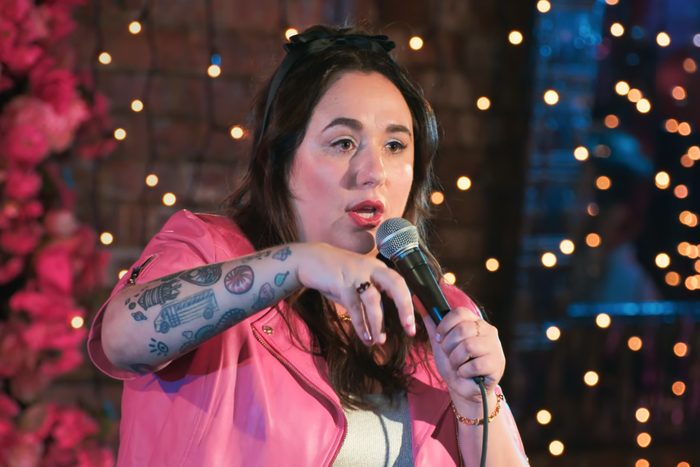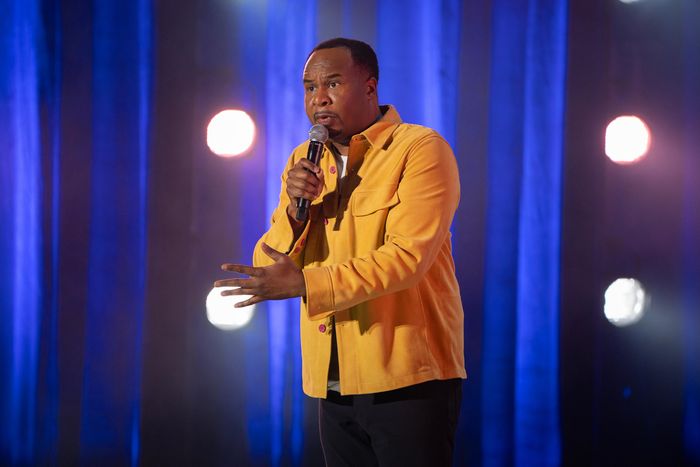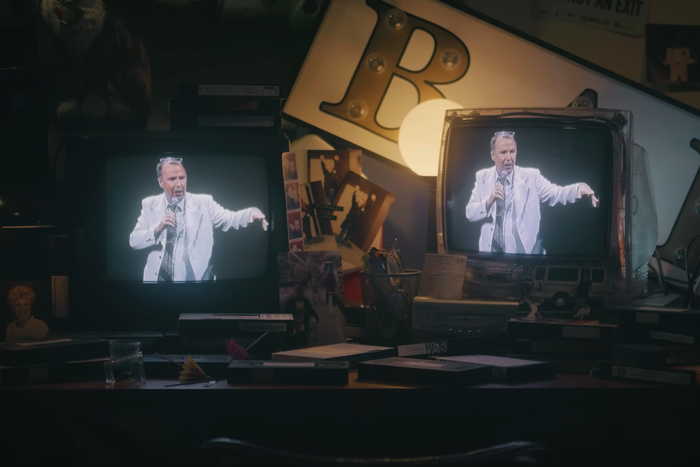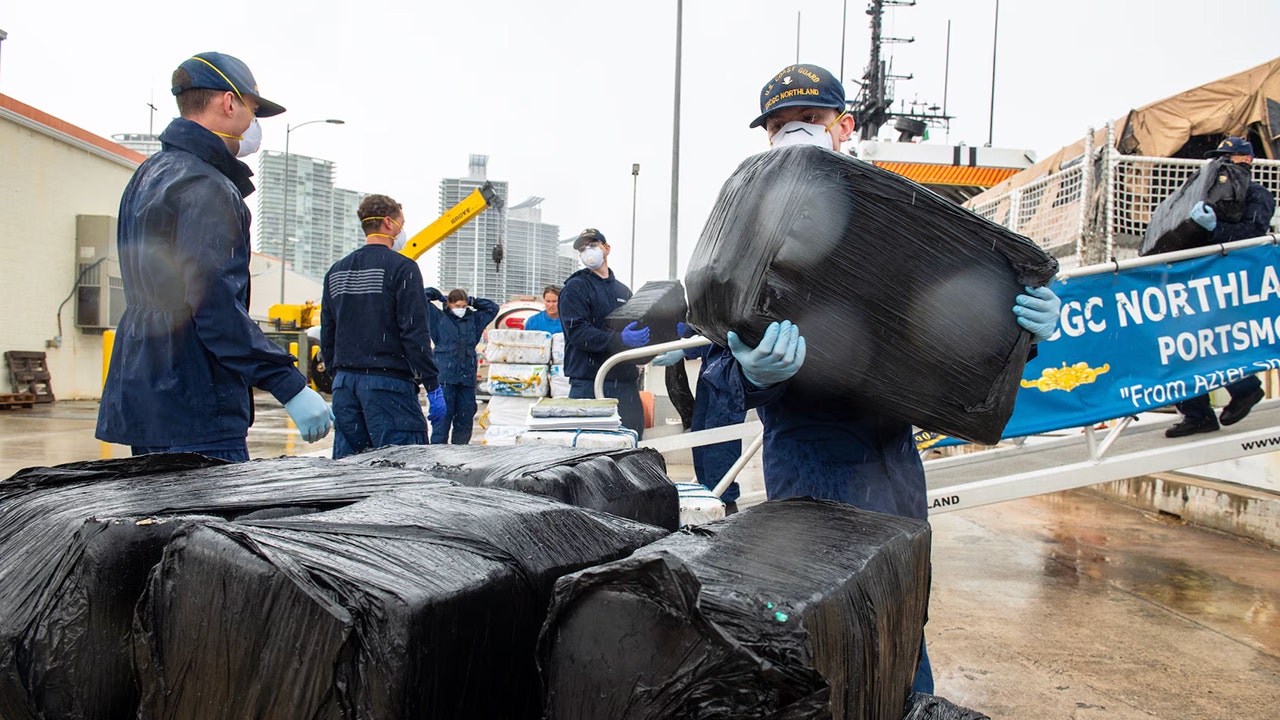Photo-Illustration: Vulture; Photos: Kate Elliott, HBO, Hulu
Thanks to more platforms paying for stand-up than ever, technological advancements that make production significantly cheaper, and social platforms that make promotion easier, we’re in the middle of a stand-up-special gold rush. Depending on how you stream, you’re likely to encounter a hastily assembled 20-minute “special” next to the masterpieces of the best comedians working. With hundreds of specials being algorithmically recommended at the same time, it’s hard to make sense of the glut. That’s what this column is for. Every month, we’ll suggest anywhere from three to five specials that are worth watching. While they might not all necessarily be the “best,” they’re worth your time for being funny, ambitious, moving, or bad in a way that must be reckoned with. There is gold in them hills, and this column will share only the most choice nuggets.
Photo: HBO
Brett Goldstein’s situation is unique. He performed stand-up for over a decade in England — in the British style of working toward an hourlong, narrative Edinburgh show every year — to little fanfare. But then, thanks to Ted Lasso, he found himself performing in the U.S. to large theater audiences who didn’t know what to expect from his act. Seventeen years into stand-up, The Second Best Night of Your Life is Goldstein’s first special, and it feels like the manifestation of reconciling all of this history. It’s structured like a classic American stand-up special with some shorter getting-to-know-you jokes at the top (which, for Goldstein, cover his newfound fame and being British in America), then some longer stories and bits in the middle, and then ending on sex stuff.
Goldstein is the strongest in the middle, where he’s afforded more space to tell longer stories and have more flights of fancy that are more typical in British comedy. There is a great section about how he loves musicals but hates plays that includes a bit about seeing “Hamlet or Macbeth, couldn’t tell you which” (a phrase he repeats over and over because “they’re both gibberish”) and experiencing the audience actually laugh at a line in the play. And Goldstein gets furious! It’s a fun move that will tickle anyone turning in to get some of that Roy Kent magic. It’s in these moments that you feel the sum total of Goldstein’s experience — British stand-up, American stand-up, Ted Lasso, etc. — and the result is a voice that is uniquely his own.
Photo: Hulu
After grinding it out in clubs for years, Jessica Kirson started gaining attention on social media two years ago for her crowdwork clips. Nothing against her crowdwork, but her true mastery is in the club-comedy art of layering punch lines and tagging jokes. It’s a skill she employs relentlessly: She squeezes and squeezes and squeezes until the premise, and the audience, is exhausted. While talking about her vibrator, for example, she says, “You know, a lot of women are like, [high pitched, nasal voice] ‘I bought a new vibrator. It’s purple. It’s amazing. I deserve it.’ My vibrator, it has pieces missing from it. I’m serious — they’re inside of me. I have more plastic inside of me than the Pacific Ocean. It’s that Magic Wand. Enormous. Like a jackhammer. It is so powerful. Did you know I dropped it the other day, and my neighbors got an earthquake warning? I also use it as an immersion blender. So it’s very helpful. I make split-pea soup with it. That’s my merch. Split-pea soup. I sell it after my shows.”
That’s like 15 to 20 laugh lines on the premise of having a powerful vibrator and, not for nothing, the joke keeps on going from there. She isn’t just getting the quick laugh of a surprise twist but building more and more laughing energy. To be in her audience, it feels like everyone is in a pot of water about to boil over. Obviously something is lost in the translation from live to filmed performance, but thankfully Kirson is a dynamic performer who slips into different voices, faces, and impressions that make it hard to look away.
Photo: Zach Zimmerman/Youtube
Surprise Me is a very good name for a comedy special, especially one that combines stand-up and magic. The title is a nod to an early standout joke from the hour about how the Dunkin’ app features the option to choose “Surprise Me,” which is mostly used as a way for a store to get rid of stale doughnuts. The title also suggests being taken care of, and Zach Zimmerman’s material is written with care and clarity. There’s something charming about how happy Zimmerman is to share the many, many jokes he worked so hard on. Like this section on being tall: “It’s exhausting being this tall. Do you know how much energy it takes to animate this body? Truly, I do a sit-up, I’m like folding the Eiffel Tower in half. Like those little French bulldogs. Okay, hear me out: We’ve been bred to look like this, and it is hard for us to breathe. I’m chopping vegetables on regulation countertops like [wheezes heavily]. I want you know, I want to use a downstairs bathroom and not get a concussion. That would be nice. I’d like to raise my hand and not tickle the feet of God. Could that be arranged? I want to talk to a short person and not turn into an umpire.”
Thematically, the special’s title is central to the fundamental question Zimmerman attempts to answer in the hour: What is the meaning of love? In the triumphant closer, he tells the story of his failed attempt at becoming a Christian magician that builds around him performing a card trick, and in the (very, very) long delay before he reveals the volunteer’s card, he says, “Love means giving someone a chance to surprise you.” Surprise Me is a YouTube special, so it doesn’t have the big production budget of the streamers’ specials, but in its ambition, it is genuinely surprising.
Photo: Kate Elliott
At the start of Cameron Esposito’s fourth special, she regales the audience with stories of rescuing a dog and tearing her own butthole in her signature high-energy style. She’s as effortlessly charismatic as always, yet as the special goes on, it’s clear some things are different. She is sitting down, she has her notes onstage, she stumbles over a word or two, and her pace has slowed. Then, 37 minutes in, the edit glitches and cuts to Esposito in an identical position but now alone and in a white room. From that point forward, for Four Pills’s more somber last third, Esposito (who also directed the special) continually cuts back and forth between both sets as she tells the audience about the behaviors that led her to check into rehab and get diagnosed with bipolar disorder. She details how she’s grown since then, including the medication that fundamentally altered her performance style. Watching the end of the special, it becomes clear how ingeniously the entire thing is built. Esposito doesn’t just tell the audience how she’s changed since she started taking the titular four pills; she shows the audience, too. She delights them with the manic behavior that made her such an exciting onstage presence before conveying why it couldn’t last.
Esposito hasn’t released a special since 2018’s Rape Jokes, and in the seven years since, there have been a lot of specials that deconstruct the stand-up special and/or focus on mental health. But like Rape Jokes did with the topic of sexual assault and the language around abuse, Esposito approaches Four Pills with uncommon grace. She doesn’t bluntly call attention to what she’s doing differently or the bravery of revealing her issues. Instead, she invites the audience into her story and lets the hour’s brilliance slowly reveal itself.
Photo: Jocelyn Prescod/Netflix
After opening with a few minutes of thanking her gay fans, Chelsea Handler spends the vast majority of The Feeling focused on two stories. As the author of six autobiographical best sellers, Handler is adept at laying out stories with perspective and voice, even if she, too, often falls back on saying “Let’s go!” or “Let’s fucking go!” where a better punch line should be. The first story is an impressive depiction of her early life. Instead of following a single linear narrative, she jumps around to different moments between when she was born and her tween years. She masterfully balances the naïve perspective of her as a kid with her snarky, bawdy comedic voice. There’s a section, for example, about when she learned how to pleasure herself at a friend’s sleepover when she was 8, where all the girls were face-down in their sleeping bags similarly proto-masturbating. “I showed up at that sleepover at 7:30 and I didn’t get up from that position until 7:30 a.m., when Jodi’s mom tapped me on the shoulder and said, ‘Honey, we’re gonna need you to leave,’” Handler tells the crowd at the Wellmont Theater. “I left that sleepover, I had rug burns on my forehead. I was so thirsty and dehydrated from sweating so much into my pajamas. I was like, ‘Does anyone have a Capri-Sun, please?’”
The second story — about trying to have sex with Andrew Cuomo and trying not to have sex with Bill Cosby — is less inventive but undeniably juicy as hell. When they get famous, a lot of comedians dishonestly underplay the celebrities in their stories, acting like they are just a regular person talking about their regular friend and/or sexual partner. Handler always plays up the gabbiness in a way that respects her audience’s intelligence.
Photo: Koury Angelo/Disney
Forget “the best stand-up working right now” — Bill Burr is fighting to be in the conversation of greatest stand-ups of all-time. That demands artistic evolution and, in an autobiographical medium like stand-up, personal growth. (Not going to therapy is hack.) As such, Drop Dead Years feels like a major leap in both categories. The best example is a section about how Burr improved his relationship with his wife after attending a friend’s funeral and having the profound realization that his wife “agreed to spend her life with me, and I’m being this curmudgeonly asshole, and I’m kinda ruining, a little bit, the one life she has.” So Burr decides to try to be more agreeable, and what follows is a portrait of his relationship, with all its built-in assumptions and resentments, that results in some of the most intensely personal material featured in a special in years. Burr shares a few examples in which his wife asks him to do something, assuming he’d say no or complain as usual, but instead he just says yes. With each example, the tension builds: When is Bill going to snap like he always does? But the harsh right turn never arrives. Instead of the instant gratification of a man breaking down for our pleasure, Burr presents something genuinely surprising and touching.
This is not to say Burr has gone soft. Artistic evolution and personal growth are difficult when you’re a successful comedian and know there is a portion of the audience who wants you never to change. It’s easy to lose audience members by being too offensive; it’s much harder to risk losing them by being honest with who you are now as a person. Burr is not self-righteous or self-pitying, and with each new special, his audience gets to see a man at war — a man fighting to grow despite all the societal, cultural, financial, and familial forces working against him. And with each special, he keeps getting better.
Photo: 800 Pound Gorilla Media via YouTube
Thanks to the recent boom in YouTube specials, the platform is awash with international comedians. As a result, every month a few shows that ran at Edinburgh Fringe Festival get uploaded, making it clear that a lot of these shows aren’t that good. That said, Crushing, which was nominated for the main prize at 2023’s Edinburgh, is good. While it might not be as narratively or conceptually ambitious as his fellow nominee Julia Masli’s much-publicized Ha ha ha ha ha ha ha or the eventual winner, Ahir Shah’s Ends, Smith’s hour of silly, exacerbated storytelling is worthy of its accolades.
Smith succeeds because he doesn’t worry about translating his Northern England cultural specifics to a potential international audience, as the specificity of background underlines the specificity of how his brain works. (“I come from a little town called Goole,” he tells the audience. “If you don’t know Goole, it’s just a stone’s throw from York, if you throw that stone onto a two-hour train.”) But more than that, Smith is fluent in the universal language of faux exasperation, which is on display in a story about a hotel manager downgrading his room because the man in the room before him shit in the bed and interacting with the hotel manager who told him this. (“I’m a new customer. I’m coming into your workplace for the first time. Don’t say ‘shit the bed!’”)
Some viewers might like the Edinburgh solo-show tick of stating outright what the show is “about” — in this case “stress” and the jokes you tell when not talking about the breakdown of your engagement — but personally, I find it unnecessary at best and, at worst, an oversimplification of what could be a multilayered, paradoxical work. It’s not a particularly distracting tick in Crushing but something that should be considered as more and more Edinburgh shows get turned into filmed pieces.
Photo: Don’t Tell Comedy via YouTube
A minute into his Don’t Tell Comedy half-hour special, J.C. Currais tells the audience he used to be on a Disney Channel original series, and it makes perfect sense. It’s not that Currais has a juvenile sense of humor but that he is friendly and able to go big in a way that feels cartoonish yet organic. There’s a joke, for example, where he tells the audience it’s time to turn off no-contact delivery on the food apps. It’s an admittedly generic area to joke in, but for Currais, it sets up an act-out of him “right on the other side of the door, just standing there, looking through the peephole like a little food goblin.” He hunches, impishly bops around, and with a voice that will surely one day be cast as a troll in an animated movie, he says, “Yes, put it on the dirty ground. I’ll eat it from the dirty ground.”
While Currais too often finds himself in familiar comedic territory, the comedy instantly feels exciting and specific to him once he does a voice or physical movement. And with Cat Daddy just being a half-hour, the problems don’t deter from Currais’s good vibes and animated act-outs. Equal parts bighearted and lighthearted, the appeal of Currais’s low-stakes silliness is almost primal, whether you are 4 or 44.
Photo: Clifton Prescod/Netflix
In Andrew Schulz’s first proper Netflix stand-up special, he showcases some of his signature lazy, cynical joke writing. Whether it is a lack of focus or creativity, Schulz has some of the worst joke math in comedy; instead of writing interesting, surprising punch lines, he machine-gun blasts the audience with a random assortment of supposedly edgy buzzwords. Early in the special, when he learns his wife is going to have a C-section, he jokes, “I’m Googling on the low ‘dad C-section.’ It’s just tranny porn showing up on my phone.” With so many clumsy jokes coming at such a fast pace, it’s hard not to zone out for the first ten minutes of the special, but eventually Schulz takes a step back, relaxes his tempo, and just tells the story of him and his wife going through the IVF process.
To that point, Schulz does an exceptional job structuring the special and laying out his story. IVF is a slow process of incremental failures, and Schulz builds empathy and tension as Life progresses. The joke writing doesn’t get better, but there is less of it, so it doesn’t distract from the storytelling. Schulz is currently one of the biggest stand-ups working and has a massive politically influential platform, and Life offers a glimpse of what got him there. Regardless of what you think of his comedic perspective, he’s able to successfully articulate it in his stand-up, which is more than can be said about many other similar podcasters.
Stand-ups have been talking about being a parent forever, but the tone changed in the 21st century with comedians getting “real” about how difficult it is. Much of this shift started with Louis C.K.’s breakthrough material in the aughts about how his daughters were annoying and disgusting. Then in 2016’s Baby Cobra, Ali Wong set the record straight, famously while seven months pregnant, about how female comedians don’t get opportunities to talk about parenthood onstage because, unlike male comedians, they’re too busy recovering and actually parenting after their child’s birth. Nearly a decade later, The Mother Lode feels like another step forward for the genre; it pushes the frankness in which parenthood is discussed even further and, like Wong’s special, confronts the history of how pregnancy has been discussed in comedy. Rosebud Baker discusses how physically and emotionally demanding the IVF process was for her, all while her husband “is next door just, like, shooting ropes to another woman.” It’s a joke on her comedian husband and the many male comedians who have centralized their experience of the IVF process and told jokes about how difficult it was for them to masturbate in a cup.
Baker, who also directed The Mother Lode, filmed half of it while eight months pregnant and half while a year into motherhood, and the special cuts back and forth between the two. Through this choice, Baker plays on the common new-mother “nine months in, nine months out” meme, but she subverts the typical beatific tone of those posts by telling arguably the darkest jokes on the subject ever put in a major special: “[Strangers] are like, ‘Why wouldn’t you breastfeed?!’ I’m like, ‘Well, it’s none of your business, but if you have to know, it’s because we’re raising her autistic … She’s formula-fed. She’s got all her vaccines. Yeah, she’s gonna know her way around a map. Don’t come for me when my kid lays your kid out in the fucking spelling bee, okay?’” The back-and-forth editing also makes the audience at home consider how Baker has changed between the two tapings, and in turn, how parenthood does or does not change a person. Comedically and tonally, Baker feels the same — she tells the same type of joke, with the same pessimistic tone, yet viscerally conveys an existential transformation.
Photo: 800 Pound Gorilla Media via YouTube
This special has three closers. That’s not to say it has multiple endings, like The Lord of the Rings: The Return of the King, but it has three jokes that are closer-worthy. It is difficult for a comedian to both think of a joke with enough meat on the bone and work to make sure to get all the meat off said bone, so it is tremendously impressive that Ian Karmel can do this multiple times in one special. There is one joke that starts with the premise that middle-aged men need hobbies to avoid becoming obsessed with conspiracy theories that builds to a brilliant five-minute flight of fancy in which Karmel holds off making a stupid pun on BBQ and QAnon because the last time he did, it killed someone from being too funny. It’s is the sort of big-swing, silly, form-breaking, conceptual bit that you don’t see much these days. It’s a great piece of work, good enough to end a show, and it comes 12 minutes into the special.
Photo: 800 Pound Gorilla Media
It’s hard to explain what alternative comedy is in 2025. Performing in nontraditional spaces has become common and commercialized, and the fractured media environment makes it difficult to define what’s “mainstream.” In this context, a new special from alternative-comedy leading light Dana Gould is a useful touchstone. Perfectly Normal doesn’t feel like a time machine back to the ’90s, but it’s a nice reminder of the sensibility that defined that revolutionary era of comedy. Gould, who used to work on The Simpsons, is an incredibly sharp writer, but his presentation is still conversational and sardonic, even when throwing out perfectly crafted jokes, like, “My father-in-law is an airline pilot. Do you know the difference between an airline pilot and God? God doesn’t walk around like a fucking airline pilot.”
While it’s become more common for comedians to be personal, Gould still cuts a bit deeper than is standard: “[My dad] was a very serious man — unless he was drinking and then he was hilarious. So I grew up with a dad who was really, really funny all the time.” This transitions into setting up a bit where the comedy is structured more like a sketch than a traditional stand-up joke, as Gould explains that his dad would sing Christmas carols all year but changed the lyrics to complain about his life. To the tune of “Jingle Bells”: “Oh, I make all the money and your mother spends it all / So I hope you want to be homeless ’cause we’re going to lose the house / Oh, your grandma’s sick, and she isn’t going to make it / And you better not cry ’cause I don’t like people’s feelings.” There are also whimsical dissections of obscure pop-culture references, like the movie Blacula, which ties into Gould mocking “podcasts dedicated to the resurgence of the alpha male,” which are currently as close to mainstream as comedy has right now. The dream of the ’90s is alive in Perfectly Normal.
Photo: Ali Siddiq via YouTube
There are some noticeable stylistic similarities between Marcus D. Wiley and Ali Siddiq, a modern master of the storytelling stand-up special who executive produced Marriage Is Major Surgery. Like Siddiq, Wiley starts the special by setting the table for the story he’s going to tell. Addressing the non-married members of the audience, he says, “Singles, I’m letting you look over the balcony of a marriage tonight, so you could see if this is something you want to do.” Then he explains the reasons why someone shouldn’t get married that double as a dog whistle to the audience members who are married and know exactly what he’s talking about. Then he starts the actual story of his 27-year (and counting) marriage with a similar clarity: “Let’s get into it, y’all. It was December 12, 1996. I was matriculating at the University of Texas Southern …” And like Siddiq, for the majority of the special, Wiley just tells the story of his relationship as it happened, and it’s thrilling to watch. Unfortunately, after 45 minutes, the structure changes, and instead of simply telling his story, Wiley shifts to riffing and pontificating on marriage more generally. This section is fun and occasionally insightful but comparatively generic. Still, as a whole, it’s impressive that Wiley is able to breathe new life into the most well-trodden of stand-up topics.
Photo: Nateland Entertainment via YouTube
Between February 2003 and May 2004, Comedy Central released 56 half-hour stand-up specials. (Some names with specials those years: Gabriel Iglesias, Bill Burr, Bruce Bruce, Paul F. Tompkins, Patrice O’Neal, Ron White, Daniel Tosh, Kevin Hart, Mike Birbiglia, and Tig Notaro.) In the era we’re currently in, everyone self-releases full hours, so it’s useful to remember the potential of well-curated, tightly written half-hours, in which a comedian who regularly performs on the road showcases all killer, no filler. And there have been some really strong half-hours released on YouTube recently. In February, Don’t Tell Comedy, “comedy’s benevolent gatekeeper,” released two great ones: Emma Willmann’s HR Booby Trap and Shapel Lacey’s Three Dads, Two Moms. Even better is Aaron Weber’s Signature Dish, which was executive-produced by Nate Bargatze and released on Bargatze’s YouTube channel (Weber co-hosts a podcast with Bargatze).
It’s hard not to see similarities between Weber and Bargatze; both are southern comedians whose acts lean heavily on deadpan stories where they are being dumb out in the world. Weber, for example, tells a story of enjoying a hot dog with cream cheese and grilled onions at a random stand outside the baseball stadium in Seattle and then evangelizing the stand for years, only to eventually learn this is a “Seattle dog” and they are served all over the city. Weber isn’t as silly as Bargatze but is a slightly sharper observer, like in his bit about Tums being a top-five candy in the country right now. It’s 30 minutes that’ll make a person excited to see his hour — a lot better than watching someone’s hour and wishing it could’ve been 30 minutes.
Photo: Sam Jay Network via YouTube
It’s hard to say if this is a special, especially because Sam Jay makes a point to call it a documentary. But I wouldn’t even call it a docuspecial, as the 37-minute Live in London features far less documentary footage than typically seen in that genre (it’s about 85 percent stand-up). It’s included here because, whatever it is, it feels like a more cohesive piece than most stand-up specials. Live in London captures Jay’s writing process — there are offstage conversations that turn into onstage material — but it also shows Jay process in real time what is happening to the U.S. weeks before the 2024 election (during which she correctly believed that Trump would win).
In any case, it’s fascinating and compelling to watch Jay muse on a topic for several minutes as she searches for a joke. There is a moment where she wrestles with the idea of people supporting Trump. She explains it doesn’t bother her because she never had faith in America: “I’m Black. I never have.” The audience is uneasy and silent until Jay finds the twist: “The real reason is I just don’t want to go back to taking dick.” Nothing against polished material, but there is an undeniable urgency to jokes told when the subject is still fresh.
Photo: Netflix
There is a thrilling tension underneath all of Liza Treyger’s stand-up: How can a person be both this messy and this self-aware? “I will do whatever to not actually feel my feelings,” one joke starts in her special Night Owl. “Like, I tried to fix a printer, and I couldn’t do it, and I went to get a butterfly tattoo.” She then points to said tattoo on her forearm and says, “This is so big for someone who is pretty casual about butterflies.” It’s befuddling and endearing to experience someone who can be so oblivious in the moment yet so clear-eyed toward her past actions.
The best example of this in the special is a section about Treyger’s compulsive relationship to scrolling on her phone. She viscerally captures how it feels to know social media is draining your attention while being incapable of quitting. At one point, she captures how dire the situation is by saying, “As a child, if someone told you your one source of joy will be watching a horse you don’t know get its hoof cleaned …” As is the case with this joke, a lot of Treyger’s punch lines trail off. The special’s delivery style and structure are loose, but it’s fitting considering her onstage persona. This might frustrate a viewer who prefers jokes to end sharply, on hard consonants, and in a way that signals to the audience when to laugh, but for the most part, Treyger’s conversational style is refreshing, and the laughs she earns roll along with a unique rhythm.
Photo: Jim McCambridge/Disney
After releasing three excellent specials over four years with Comedy Central, it’s lovely to see Roy Wood Jr. free from the constraints of working for the network. Lonely Flowers shows one of the greatest stand-ups working today free to express himself to his full capacity. Especially in the genre of political comedy, which tends to be reactionary across all party identifications, Wood works with purpose and clear intention. Rather than delivering a special that feels like a grab bag of hot-button issues, he focuses on the idea of connection, exploring what is lost when we continue to eliminate human interaction even in places as seemingly mundane as a grocery-store checkout.
There is a form-following-function aspect to Wood’s performance as he strives to bring humanity to all of these everyday moments to get the audience to focus on the humanity lost in their everyday lives. Initially, while watching the special, I thought it featured a gratuitous use of callbacks, but then it became clear Wood was utilizing them not to show off, but to emphasize Lonely Flowers’s theme of creating moments of connection. No other living stand-up brings Wood’s level of thoughtfulness and sensitivity to political comedy. His mastery of both emotional honesty and sociopolitical truth-telling puts him in Richard Pryor territory.
Photo: Doug Stanhope via YouTube
While most stand-up comedians aspiring to be edgy these days focus their specials on the same ten supposedly untouchable topics, Doug Stanhope is genuinely transgressive. In Discount Meat, released on December 31, this manifests in material that is really out there in terms of appropriateness, like a 13-minute section comparing 9/11 to COVID or a shockingly thorough exploration of whether pedophiles go into having kids with the intention of molesting them one day. But beyond touching on edgy subjects, Stanhope’s work pushes back on orthodoxies. And Discount Meat focuses on the orthodoxies he’s seen among so-called political independents. In doing so, he offers a trenchant critique of a version of libertarianism that he used to be associated with that many in comedy have since embraced: “I’ve noticed a lot of anti-government people have become very pro-government in their efforts to get the government to get government out of our lives.”
The downside to the special’s unrelenting nature is that it can, at times, feel exhausting. Its watchability is also affected by its unusual presentation: Instead of showing Stanhope performing onstage, the camera focuses on a room filled with Stanhope-related paraphernalia and multiple old TVs playing his performance. It feels like you are in Stanhope’s bunker, watching specials on a pirated feed. It’s bizarre and might not be for everyone sitting down for some casual stand-up comedy after a long day at work, but for those ready to engage, Discount Meat’s unsettling style adds another layer of intrigue to the experience.





